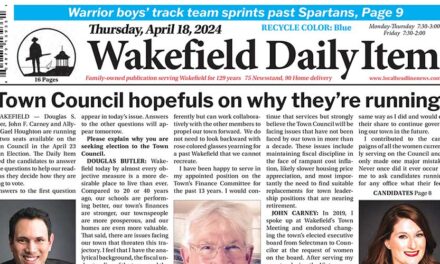By MARK SARDELLA
 WAKEFIELD — Ted Reinstein is best known as a longtime correspondent for WCVB-TV’s “Chronicle,” but he also maintains a strong love of live theater, having performed in regional theater in Boston, New York and Chicago.
WAKEFIELD — Ted Reinstein is best known as a longtime correspondent for WCVB-TV’s “Chronicle,” but he also maintains a strong love of live theater, having performed in regional theater in Boston, New York and Chicago.
Reinstein brought his booming broadcaster’s voice as well as a theatrical flair to The Savings Bank Theatre last night as he delivered the second Sweetser Lecture of the season.
A Boston area native, Reinstein grew up in Winthrop, in the shadow of Logan Airport.
“I think I was in college before I realized that you didn’t have to yell to be heard,” he quipped.
Reinstein is also the author of “A New England Notebook: One Reporter, Six States, Uncommon Stories.” He told the audience that the book came about as the result of the need to cut down two to three hours of video footage to the 15 minutes that ultimately airs on Chronicle. Writing the book provided an outlet for him to expand on some of the stories that he wanted to spend more time on.
Reinstein shared a few of his favorite New England stories with the audience last night.
He began with the story of Fred Tuttle, whom he called “Vermont’s most beloved folk hero.” He was also, according to Reinstein, “Vermont’s most famous dairy farmer and America’s most unlikely movie star.”
Reinstein got to know Tuttle as a result of several Chronicle stories. He related how in the mid-1990s, age and ill health forced Tuttle to give up farming.
According to Reinstein, John O’Brien, who had grown up next door to Tuttle returned home to Vermont from college with a passion for a particular type of filmmaking called “community cinema.” O’Brien had fond memories of his older neighbor with the colorful personality. He wrote a film about a broken-down dairy farmer who needed a job with health benefits. O’Brien came up with the perfect job for Tuttle, Reinstein said, casting him as a candidate for Congress.
In the movie, Tuttle wins, and the film was a huge art-house hit. It was the highest grossing film in Vermont history and Fred Tuttle became a huge celebrity, Reinstein said.
But, Reinstein told the audience, when the movie buzz started to die down a few years later, O’Brien had an idea to rekindle interest: Why not run Tuttle for real? They took out nomination papers and Tuttle beat his opponent in 1998 Republican primary for U.S. Senate. He would then square off against incumbent Democrat Patrick Leahy.
Reinstein decided to spend some time on the campaign trail with Tuttle, who proved to be an unconventional candidate, especially when he officially endorsed his opponent, Leahy.
“Fred still got 20 percent of the vote,” Reinstein said. “Leahy will tell you to this day that it was the most scared he’s ever been in a race.”
Reinstein also related a story that came from a Chronicle piece he did on the 40th Anniversary of the Norman Rockwell Museum in Stockbridge. Reinstein focused on a favorite painting from later in Rockwell’s career, “Moving Day,” which depicted black and white children together on a sidewalk with a moving truck in the background.
Reinstein focused on Ray Gunn, a Stockbridge kid who served as Rockwell’s model for one of the black children in the painting. Much later in his life, Gunn served as a museum tour guide where he told visitors about his connection to the painting.
Reinstein closed with a few of his favorite stories about Maine, as well as his favorite “factoids” about the Pine Tree State. He noted that Maine is the only state in the U.S. that borders only one other state and if you could straighten out the coast of Maine with all of its inlets and peninsulas, it would be 3,000 miles long.
Reinstein also said that he was announcing last night for the first time details about his next book.
“The book is about some of New England’s most famous feuds,” Reinstein said. “The title of the book is ‘Wicked Pissed.’”




